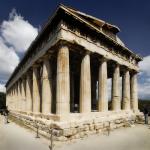|
This section contains 5,017 words (approx. 17 pages at 300 words per page) |

|
Afterlife. Greek concepts of the afterlife varied tremendously. Generally, people accepted that some sort of existence continued after death, and thus elaborate funeral rituals existed, including regular family visits to tombs to bring offerings for the dead. People who died prematurely or violently or who were not given adequate burial could become vengeful ghosts. The picture of the afterlife in Homer was gloomy, with the dead portrayed as vague shadowy figures twittering and squeaking in the realm of Hades. Both Hesiod and Homer also described Elysium, or the Isles of the Blessed, as a place inhabited after death by a few favored heroes; it probably was a survival from Minoan beliefs. The mystery religions were unusual in promising some form of pleasant afterlife as a consequence of being initiated and perhaps following some set of ritual and/or ethical practices...
|
This section contains 5,017 words (approx. 17 pages at 300 words per page) |

|




